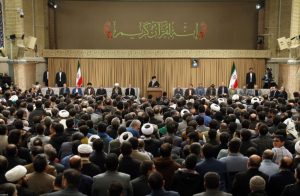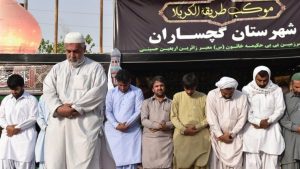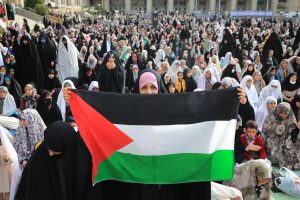Supporting Gaza People: Gaza, often described as the bleeding heart of the Muslim Ummah, is engulfed in suffering under the weight of a relentless siege and ongoing conflict.
The impassioned letter from Iranian Quran reciters to their esteemed Egyptian counterparts is not merely a plea but a moral imperative rooted in faith.
The Humanitarian Crisis and the Call for Supporting Gaza People
The crisis in Gaza is catastrophic. A prolonged blockade has cut off access to essential supplies, plunging the population into a state of perpetual despair.
Families are shattered, hospitals are overwhelmed, and hope is a fleeting luxury.
The Quran issues a clear directive: “And why should you not fight in the cause of Allah and for those who, being weak, are oppressed—men, women, and children?” (An-Nisa: 75).
This verse is a resounding call to action, urging believers to champion the cause of supporting Gaza people.
The Iranian reciters’ letter emphasizes that the voice of the Quran must extend beyond recitation to embody meaningful action, addressing the immediate needs of Gaza’s population.
By advocating for humanitarian aid, the global Muslim community can answer this divine mandate. you can read more about this topic here.
The Role of Rafah Crossing in Supporting Gaza People
The Rafah crossing is Gaza’s lifeline to the outside world. Its closure has strangled the flow of critical supplies, from food and medicine to materials for rebuilding.
Reopening Rafah is not just a logistical necessity; it is a matter of life and death for thousands.
Supporting Gaza people hinges on prioritizing this vital pathway, as it enables the delivery of life-saving resources.
The Iranian reciters underscore that an open Rafah crossing would bring more than material aid—it would restore a glimmer of hope to a beleaguered population.
Egyptian Quran reciters, with their profound influence in public and religious spheres, are uniquely positioned to advocate for this cause, pressing for policies that ensure humanitarian access.
The Influence of Egyptian Quran Reciters in Supporting Gaza People
Egypt’s Quranic scholars are more than spiritual guides; they are cultural and social luminaries whose recitations inspire millions across the Muslim world.
The Iranian reciters’ letter recognizes this unique platform, urging their Egyptian counterparts to harness their authority in supporting Gaza people.
By raising their voices, these scholars can shape public opinion, influence religious institutions, and even impact governmental decision-making. Their advocacy can keep the plight of Gaza at the forefront of global consciousness.
Supporting Gaza people through such influence transforms spiritual leadership into a force for tangible change, amplifying the call for justice.
Mobilizing Religious and Public Spheres for Supporting Gaza People
The Iranian reciters’ letter is a clarion call for Egyptian scholars to move beyond recitation to activism. Egypt’s religious institutions, from local mosques to the prestigious Al-Azhar, wield immense influence.
By mobilizing these platforms, scholars can foster a unified movement dedicated to supporting Gaza people.
Public campaigns, sermons, and interfaith dialogues can raise awareness about the crisis and pressure authorities to act.
The Iranian reciters emphasize that the Quran’s message of justice must be lived, not merely spoken. Supporting Gaza people through these channels can create a ripple effect, inspiring broader regional and global efforts to address the crisis.
Practical Steps Toward Supporting Gaza People
Reopening the Rafah crossing is a critical step, but supporting Gaza people demands a multifaceted approach. Egyptian reciters can collaborate with international organizations to ensure aid reaches those in need.
They can use their platforms to educate communities about the crisis, fostering solidarity and collective action.
The Iranian reciters’ letter underscores that every action counts, from issuing public statements to organizing relief efforts.
By standing with the oppressed, these scholars can embody the Quran’s teachings in a profound way, ensuring that supporting Gaza people translates into concrete outcomes.
Global Solidarity in Supporting Gaza People
The crisis in Gaza is a global concern, not confined to one region. Supporting Gaza people requires a united front, with voices from across the world joining in solidarity.
The Iranian reciters’ letter is a step toward this unity, calling on Egyptian scholars to bridge divides and amplify the cause. By working together, Muslim communities can create a powerful movement for justice.
The influence of Egyptian reciters extends far beyond their borders, making their role in this global effort pivotal.
Supporting Gaza people through coordinated action can transform the narrative, bringing hope to a region in despair.
Challenges and Opportunities in Supporting Gaza People
The path to supporting Gaza people is fraught with challenges, from political complexities to logistical barriers. Yet, these challenges also present opportunities for meaningful action.
Egyptian reciters can navigate these complexities by leveraging their moral authority to advocate for policy changes.
They can partner with humanitarian organizations to streamline aid delivery and ensure transparency.
The Iranian reciters’ letter highlights the potential for collective action to overcome obstacles, emphasizing that supporting Gaza people is a shared responsibility.
By seizing these opportunities, scholars can lead the charge in alleviating Gaza’s suffering.
A Unified Voice for Supporting Gaza People
The letter from Iranian Quran reciters to their Egyptian counterparts is a powerful reminder of the Quran’s call to stand with the oppressed.
Supporting Gaza people is not just a humanitarian act but a spiritual obligation that demands resolute action.
The reopening of the Rafah crossing, advocacy from influential figures, and global solidarity are critical steps toward alleviating Gaza’s suffering.
Egyptian Quran reciters, with their profound influence, have a unique opportunity to lead this charge, ensuring that the voice of the Quran is heard not just in recitation but in transformative action.
Let us unite in supporting Gaza people, fulfilling the divine mandate to uplift the weak and oppressed.
source: raialkhalij



